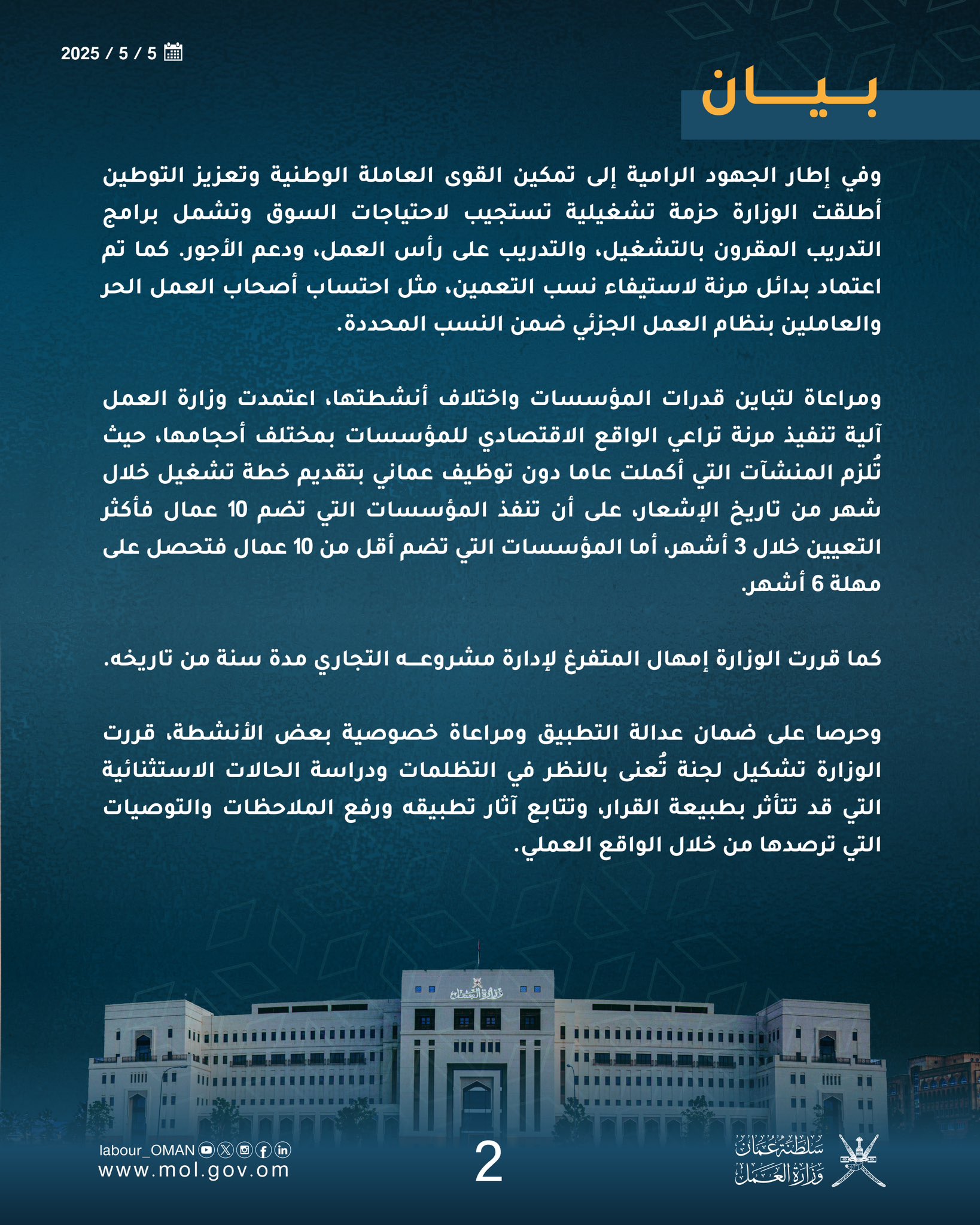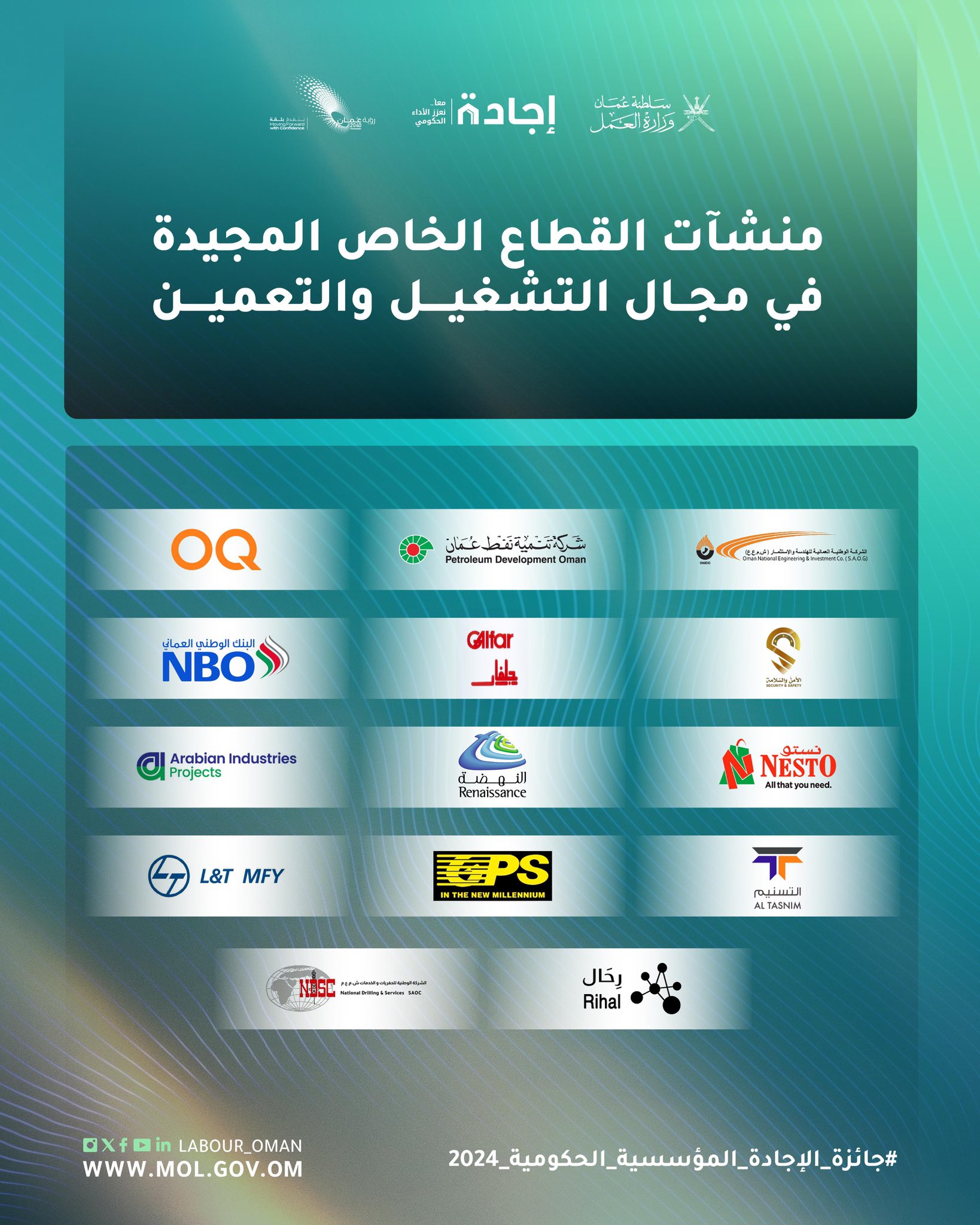
Oman's latest: New job rules, Omanisation push, first labour office in Qatar, and workers’ rights guide in 6 languages
Employment LandscapeEconomy & Policy#Work Culture#HRCommunity#EmploymentLaw
The Ministry of Labour, Oman has introduced new employment regulations to increase local talent workforce participation in the private sector as part of its ongoing Omanisation strategy, and improve the region's labour market.
As part of the new regulations, Companies operating for over a year without employing any Omanis are now required to submit an employment plan to the Labour Ministry within a month.
Omani Employment Regulations
The Ministry aims to achieve a balance in business sustainability with the job nationalisation agenda, and is also offering incentives, training-linked job programs, wage support, and flexible implementation timelines.
It also addressed the huge gap in Omanisation rates across industries, and noted that some firms do not hire Omanis talent despite a large expatriate workforce in the region.
After reviewing the data, the Ministry found that about 1,000 large companies employ nearly 200,000 Omanis and 245,000 expatriates—about 200 Omanis and 245 expats per company, with a 44% Omanisation rate. In comparison, around 19,000 businesses hire 60,000 Omanis and 300,000 expats, with a much lower Omanisation rate of less than 17%—about 3 Omanis for every 15 expats.

The most concerning fact of the data was that: over 245,000 companies don’t employ a single Omani, even though they rely on more than 1.1 million foreign workers.
It also emphasised the target for businesses to hire at least one Omani citizen after one year of operation. To ensure effective implementation:
- Private sector companies with more than 10 employees must comply within three months,
- Smaller businesses have six months, and
- Sole proprietors are exempt for at least one year.
As part of the regularisation, a dedicated committee will oversee implementation, appeals, and policy impact.

Foreign Firms & Omanisation Policy
Recently, Oman’s Ministry of Commerce, Industry and Investment Promotion (MoCIIP) issued a new directive requiring foreign investors to hire at least one Omani national within one year of starting commercial operations.
The Omani employee must also be registered with the General Authority for Social Insurance.
This move supports the Ministry of Labour’s Omanisation policy, which aims to increase the employment of Omani citizens in the private sector.
The directive comes after a Council of Ministers’ decision, which plans to reduce commercial registration fees for foreign investors and treat them as equal to Omani investors, given that they implement Omanisation policy effectively.
Effective from April 2024, MoCIIP has implemented administrative restrictions on transactions through the Oman Business Platform for foreign investors who fail to meet the employment obligation within a year of registration. A grace period of 30 days—subject to extension—is granted for companies to rectify non-compliance.
Additionally, if the employed Omani is later dismissed, the obligation is automatically re-applied electronically, enabling MoCIIP and the Ministry of Labour to monitor compliance more effectively.
The Ministry also recently applauded private sector organisations for their outstanding role in employment and Omanisation implementation. These include:

In 2023, Eng. Ammar bin Sulaiman Al Kharousi, Director General of the Investment Services Centre at MoCIIP announced the fee reductions for foreign investment companies via its digital platforms.
And underlined that the commercial register now includes an alert informing investors of the employment condition one year after registration, and that foreign investors hiring Omani nationals will contribute to local economic development and improve the labour market.
Oman's first labour office in Qatar for better job opportunities for Omani talent
The Ministry is consistently working to improve the region’s labour market and increase the workforce participation of Omani nationals.
Most recently, the Sultanate of Oman opened its first overseas office in Doha, Qatar—a strategic move to strengthen employment and HR cooperation between the two nations.
The labour office aims to create quality job opportunities for Omanis in Gulf markets, in line with the Omanisation vision of empowering national talent. It will coordinate with Qatari entities, support job placement, provide career guidance, and monitor labour market trends.
H.E. Khalid bin Salem Al Ghumari, Undersecretary of the Ministry of Labour for Labour, stated: "The office is one of the strategic tools for marketing Omani competencies trained according to the highest standards. It also contributes to facilitating the direct recruitment process, coordinating training programs, and providing a supportive environment for Omanis working in Qatar. The office will also support joint development initiatives and enhance the job readiness of Omanis by providing quality opportunities in a stimulating and advanced work environment."
H.E.Sayyid Ammar bin Abdullah Al Busaidi, Ambassador of the Sultanate of Oman to the State of Qatar, also emphasised that: “the opening of the office is not merely an administrative procedure, but rather a true embodiment of the vision of the wise leaderships of the Sultanate of Oman and the sisterly State of Qatar towards deepening the bonds of cooperation and expanding the areas of professional empowerment for Omani youth in advanced work environments that push them towards creativity and excellence.”
The initiative stems from a bilateral memorandum of understanding and reflects a broader goal of regional integration and professional development for Omani youth.
You may also like:
- Kuwait tightens rules on hiring expatriate workers pending verification
- Abu Dhabi’s DoH shuts down 4 healthcare facilities for sick leave scam; Staff under legal investigation
- Emirates to pay bonus worth nearly 40% of annual basic salary to eligible employees: Annual Report
- Here's why MHRSD introduced mandatory 'Occupational Fitness Tests' for all employees
- Farewell Skype: What it reveals about WorkTech’s biggest mistakes?
- Microsoft reveals all about AI-powered future of work
Launching Workers Rights Guideline in 6 Languages Supporting Oman's Diverse Workforce
Furthermore, in order to improve the labour market, the Oman Human Rights Commission in collaboration with the Labour Ministry, has launched the Guide to the Rights of Workers in the Private Sector in six languages to raise awareness of labour rights among workers and employers of diverse ethnicity.
The guide mentions key workers rights in Oman’s private sector such as written employment contracts, non-retention of passports, protection against forced labour, equal treatment, and complaint procedures. It also covers working hours, leave entitlements, health and safety, and end-of-service rights.
The six languages – Arabic, English, Urdu, Hindi (referred to as Indian), Bangladeshi, and Filipino (Tagalog) – ensures maximum accessibility and comprehension among Oman’s diverse expatriate workforce, reinforcing Oman’s commitment to justice and workplace equality.
Dr. Rashid bin Hamad Al Balushi, Chairman of the Omani Human Rights Commission, said: “The launch of the Guide to the Rights of Workers in the Private Sector comes in response to a real need among all parties involved in labour relations to understand the rights and duties stipulated in the Omani Labour Law.”
“The guide provides a comprehensive explanation of the most important rights enjoyed by workers in the private sector, most notably the requirement:
- To conclude a written employment contract, with a copy of it given to the worker,
- The prohibition of the employer keeping the worker's passport or personal documents without his written consent,
- The prohibition of all forms of forced or compulsory labor,
- Ensuring equality among all workers without discrimination on the basis of gender, language, religion, color or any social status, and
- The right of the worker to submit complaints and grievances in accordance with approved regulations.
It includes a set of official communication methods that enable workers and employers to communicate with the relevant.”









